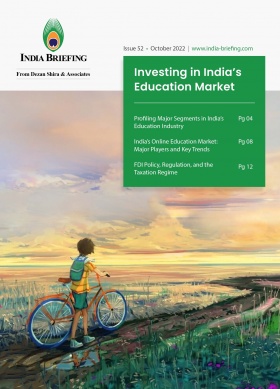Non-Resident Indians Confident About Investing in India, Cite Better Returns
A recent survey of NRIs by a fintech platform shows their preference towards investing in India over Western markets for higher returns. Multiple risk mitigation strategies employed by NRIs, such as diversified currency exposure to overcome currency fluctuations, underscore their determination to capitalize on what they view as favorable investment opportunities available in India. Nowhere is this more visible than in investments in the country’s real estate sector.
India has recently witnessed a significant inflow of Non-Resident Indian (NRI)-led investments due to the abundance of investment alternatives, such as mutual funds, stocks, IPOs, bonds, and real estate, available in the country.
A survey conducted by SBNRI, an NRI-focused fintech platform, reveals that approximately 53 percent of NRIs believe that domestic investments offered better returns compared to other countries.
The survey analyzes data from various countries, including the US, Singapore, UK, Australia, and others. It also sheds light on the preferences and challenges faced by NRIs when investing in India.
The SBNRI team commented on India’s investment outlook, emphasizing the country’s economic performance and global position as indicative of substantial investment prospects for NRIs.
India’s stable economic growth across various sectors has resulted in reduced market volatility, rendering it an appealing investment destination for NRIs.
India emerges as a lucrative investment destination for NRIs
Survey results reveal that a significant number of NRIs residing in Singapore, the UK, the US, and Australia perceive India as an attractive investment hub.
About 53 percent of NRIs based in Singapore, who took part in the survey, reportedly affirmed that India provides exceptional returns on investment compared to other countries where they have allocated their funds.
The sentiment is mirrored by NRIs from the UK, the US, and Australia, indicating a consistent trend across these regions.
Regulatory hurdles and risk mitigation in Indian investments
Navigating the investment landscape in India comes with its share of regulatory challenges for NRIs. The survey findings shed light on the hurdles faced by NRIs from Australia, Singapore, and the UK, with nearly 46 percent encountering difficulties in obtaining necessary approvals or licenses.
Repatriating funds also proves to be a challenge for over 35 percent of UK-based NRIs and NRIs from other countries. Singapore-based NRIs face additional challenges due to restrictions on foreign investment in certain sectors.
In addition to regulatory risks, currency fluctuations can limit investment returns.
NRI investors, however, have been adept at managing these risks.
For example, around 30 percent of the NRIs based in the UK opt to invest in Indian stocks or funds denominated in pound sterling. Furthermore, 27 percent of them employ hedging techniques, such as forward contracts or currency options, to offset these risks. Diversifying exposure is also embraced by NRIs as an effective means of managing currency risks.
These risk mitigation measures underscore the adaptability and determination of NRIs to seize India’s promising investment opportunities, despite the regulatory challenges and currency fluctuations they encounter. They recognize the potential rewards of investing in the Indian market and are determined to capitalize on the favorable investment opportunities available.
Investing in India’s real estate market
The Indian real estate market is seeing an increasing interest from NRIs, with investments reaching US$13.1 billion in 2021 and expected to grow by 12 percent in 2022.
The industry presents a lucrative investment opportunity for NRIs, driven by various factors, such as regulatory reforms, innovative marketing, emotional connections, and favorable rental yields.
Meanwhile, the digitalization of the property industry has made it convenient for NRIs to explore, evaluate, and invest in properties remotely, positioning Indian real estate as a unique investment opportunity in the digital age.
Commercial properties in prominent tier-one and tier-two cities are popular investment choices. Real estate companies and developers leverage digital technology to showcase their projects to a wider audience and tailor their marketing efforts accordingly.
Innovative solutions have been found to tap expatriate buyers, such as online launches, virtual property exhibitions, and facilitating digital transactions.
Key factors driving growth in India’s real estate sector
- Regulatory reforms: The introduction of the Real Estate Regulatory Authority (RERA) has increased transparency and accountability in the real estate industry, boosting investor confidence.
- Innovative marketing: Real estate companies are leveraging digital technology to offer 3D walkthroughs and virtual property exhibitions, allowing NRIs to explore properties remotely and make informed investment decisions.
- Emotional connections: NRIs often invest in Indian real estate to maintain a connection with their homeland and secure a safe space for themselves and their families.
- Rental yield: The rental yield of Indian real estate has increased from an average of two-three percent earlier to three-five percent now, making it a promising investment decision for NRIs seeking a steady source of income.
- Commercial properties: Commercial properties offer higher returns and are easier to manage, making them a clear choice for NRIs seeking a favorable return on investment.
- Prominent cities: NRIs display significant interest in prominent cities like Gurgaon (now Gurugram), Bengaluru, and Hyderabad.
- Tier-two cities: Smaller tier-two cities, such as Ahmedabad, Chandigarh, Thiruvananthapuram, and Kochi, have also emerged as potential investment destinations, ranking high in real estate investment potential.
- Digital sales models: Real estate companies are adopting digital sales models, allowing NRIs to invest in Indian real estate remotely without having to visit in person.
- Virtual Reality (VR): VR headsets have emerged as a popular tool for property walkthroughs, providing potential buyers with a unique and immersive experience.
- Big data analytics: Developers are leveraging big data analytics to identify and target specific market segments, enhancing the efficiency of their marketing efforts.
About Us
India Briefing is produced by Dezan Shira & Associates. The firm assists foreign investors throughout Asia from offices across the world, including in Delhi and Mumbai. Readers may write to india@dezshira.com for more support on doing business in India.
We also maintain offices or have alliance partners assisting foreign investors in Indonesia, Singapore, Vietnam, Philippines, Malaysia, Thailand, Italy, Germany, and the United States, in addition to practices in Bangladesh and Russia.
- Previous Article Why India is Allowing Chinese Fast-Fashion E-Commerce Giant Shein to Re-Enter its Market
- Next Article La nuova politica del commercio estero dell’India 2023 in vigore dal 1° aprile: i punti chiave








